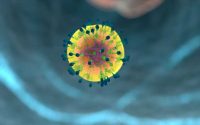This Mother Shows What Post-Natal Depression Is Really Like With Two Images
An American photographer has taken an amazing series of images of her friend, a mother who is suffering from Post-Natal Depression.
Danielle Fantis took the photos of mother-of-two Kathy DiVincenzo, who then shared just two to her Facebook to prove a point.
In one image, DiVincenzo is in her daughter’s room, with her daughter sitting by her side, pleading for attention, while she tries to change the nappy of her other child, who is just a baby. She looks completely disheveled, with her hair half up and her crop top falling off her shoulders. Her face shows the exhaustion and frustration she feels.
Meanwhile, the other image shows an image of ‘perfect’ motherhood, where her hair is perfectly waved, she is dressed nicely, her daughter is quietly playing, and her baby is fast asleep.
RELATED: New Study Finds That The Contraceptive Pill Is Linked To Depression
DiVincenzo explained on Facebook that she wanted to show what motherhood is really like for her day to day.
“I feel like it’s time to show you what that can really look like, not just the side of me that’s “Facebook worthy,” DiVincenzo wrote.
“The truth is, both of these pictures represent my life depending on the day.
“I would only ever comfortably share one of these realities though and that’s the problem. The only thing more exhausting than having these conditions is pretending daily that I don’t.
“I work twice as hard to hide this reality from you because I’m afraid to make you uncomfortable.
“I’m afraid you’ll think I’m weak, crazy, a terrible mother, or the other million things my mind convinces me of and I know I’m not alone in those thoughts.”
“We need to stop assuming that the post-partum period is always euphoric, because for 1 in 7 it’s not.,” she added.
“We need to start asking new parents how they’re doing in a deeper way than the normal, “so how are you doing?” that triggers the knee jerk, “everything’s great!” response.
“We need to learn the signs, symptoms, risk factors, and support plans for post-partum conditions.
“We need to break the stigma and #EndTheSilence by sharing our stories and letting others know they’re not alone.”
The post has since gone viral and other mothers have shared their stories of post-partum depression.
The photographer Danielle Fantis also decided to share a post with more photos from the shoot.
RELATED: Reduce Your Depression Risk By Adding This To Your Diet
Fantis also shared her own story of post-partum depression, revealing that the experience was totally different between her first baby and her second.
“I had my first baby 6 weeks early when I was 18 with no support from my son’s father,” she wrote. “My situation was the perfect recipe for Postpartum Depression, yet I never got it.
“When I had my daughter, 7 years later with the cookie cutter “perfect” situation, the feelings that started to surface were completely unexpected. I felt blindsided. I had a supporting husband, I was able to stay home with my baby, we had a beautiful home and were financially stable, and my baby was healthy.
“I felt so guilty for having the intrusive thoughts and feelings that I was having. I thought many times that I could just “snap” out of it and that I had absolutely no reason to be feeling the way I was feeling. You see, that’s the problem with Postpartum Mental Illnesses, women feel guilt and shame and aren’t prepared for the fact that postpartum mental illness is real and does happen.”
She explained that four months later, she finally reached out, and managed to put preventative measures in place for when she had baby number three.
The take away from these stories? It’s important to know the symptoms of post-natal depression and we should be more open to talking about it and sharing these stories.
According to Perinatal Anxiety And Depression Australia (PANDA), these are the key symptoms to look for:
• Panic attacks (a racing heart, palpitations, shortness of breath, shaking or feeling physically ‘detached’ from your surroundings)
• Persistent, generalised worry, often focused on fears for the health or wellbeing of baby
• The development of obsessive or compulsive behaviours
• Increased sensitivity to noise or touch
• Changes in appetite: under or overeating
• Sleep problems unrelated to the baby’s needs
• Extreme lethargy: a feeling of being physically or emotionally overwhelmed and unable to cope with the demands of chores and looking after baby
• Memory problems or loss of concentration (‘brain fog’)
• Loss of confidence and lowered self esteem
• Constant sadness or crying
• Withdrawal from friends and family
• Fear of being alone with baby
• Intrusive thoughts of harm to yourself or baby
• Irritability and/or anger
• Increased alcohol or drug use
• Loss of interest in sex or previously enjoyed activities
• Thoughts of death or suicide
If you or someone you know is experiencing post-natal anxiety or depression, call the PANDA National Helpline on 1300 726 306.
Source: Read Full Article


